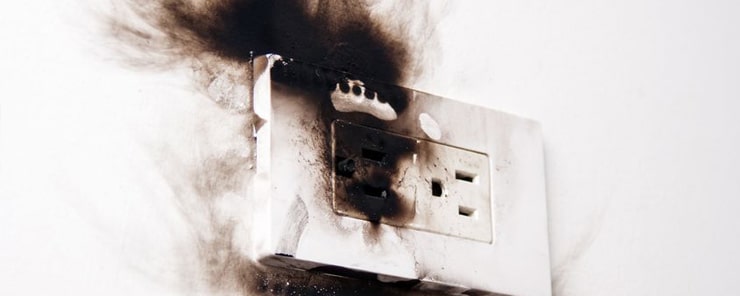Several basic electrical home repairs are relatively simple and can be tackled on a DIY basis. However, some electrical system problems are considered emergencies and should be handled urgently by a professional emergency electrician.
What is a Home Electrical Emergency?
An electrical emergency in the home is any fault with the electrical system that could result in damage or harm to people or property, including electrical shocks, fire, or injuries. Electrical emergencies can be due to faulty electrical equipment, natural disasters or human error.
It’s important to learn the difference between an electrical problem that is manageable and one that is major and requires urgent action to avoid property damage, injury or even death. Let’s review some common electrical system issues that could be emergencies and how to handle them.
1. Your power goes out
This can happen frequently during storms, accidents, or when there is a major equipment failure that is not confined to your home.
Check to see if the power loss is just your home or if it’s affecting your neighbors as well. If it’s just your home, it’s likely an issue with your circuit breakers or fuse box. Try resetting the main circuit breaker. If it’s a wider outage, call your electricity supplier.
If resetting the circuit breaker doesn’t work, put in a call to an emergency electrician. While you wait, take steps to protect your property and family including:
- Shutting off the power at the main breaker.
- Turning off appliances and lights to prevent damage from a sudden surge when the power comes back on.
- Refrain from opening refrigerator or freezer doors to conserve the cold air for as long as you can.
- Depending on the season, it’s wise to have battery-powered fans or heaters, blankets, candles and flashlights on hand while you wait. Cooking can take place on a gas grill if needed.
- If you have downed power lines that are causing the outage, stay away from the area and be vigilant for the signs of a fire. Call emergency services or 911 if you see fire.
2. Someone gets shocked
Not all electrical shocks are life-threatening, but they could be, depending on the current type, voltage strength and how the current travels through the body. It’s important to stay vigilant about your home electrical system, noticing and repairing issues like exposed or frayed wires.
A tingling or shock when touching an appliance or outlet or hearing buzzing or humming sounds from electrical panels or outlets could be signs of the possibility of electrical shock. Never touch exposed or wet wires or attempt to repair an appliance that is plugged in or an outlet without cutting the power.
- For minor shocks, turn off the power and call an emergency electrician.
- For serious shocks, avoid touching the person if still in contact with the current and call 911 immediately. If it’s safe to do so, turn off the power at the circuit breaker box.
- Follow the instructions of the 911 operator which may include keeping the person warm or administering CPR until help arrives.
Check out our blog 7 Things You Should Do Every Year to Keep Your Home’s Electrical System Working Properly to learn more about taking care of your home’s system.
3. There is an electrical fire
Electrical issues are commonly the cause of home fires. It’s important to look for red flags in your electrical system and get problems repaired before they turn into emergencies.
Early warning signs of a possible electrical fire may include burning smells or buzzing or sizzling sounds coming from an outlet. You may also observe a brown, black or melted appearance at the outlet. Other red flags include warm wall plates or smoke or sparks coming from an outlet or appliance.
To prevent electrocution risk, don’t unplug appliances or switch off the risky outlet. If a fire is underway, first get everyone out of the house and call 911. If it’s safe to do so and you have an electrically approved fire extinguisher, you can use that to put out the fire and cut the power at the main breaker. Never use water to put out a fire on electrical equipment, as it can expose you to electrocution.
4. Your circuit breaker fails or short circuits
While it might not always be an electrical emergency, if your home’s circuit breaker is faulty or overloaded, it can lead to fires or electric shock when the electrical current takes the wrong path. Circuit breaker faults often happen if the box is old, outdated or overloaded.
Red flags that your circuit breaker is faulty include burning odors, sparks, scorch marks, hot to the touch, visibly damaged wires and frequent tripping.
If you notice any of the above red flags, immediately shut the power down and call an emergency electrician. Even if you don’t notice any of the more worrisome signs, upgrading an old electrical panel that continues to trip is a wise move for peace of mind and protection of people and property.
Pay attention to your home’s electrical system and don’t ignore the signs that something may be malfunctioning or is about to. Having your home inspected by a professional electrician if you notice problems is a good way to avoid electrical emergencies in the future.
Check out our blogs How Do I Find a Qualified Local Electrician and 10 Basic Electrical Troubleshooting Tips for Your Home to learn more about how to spot and address potential residential electrical emergencies.
How Can We Help?
At Shockley Electric, we address important home safety issues such as power surges, faulty electrical wiring and potential fire hazards when we do electrical preventive maintenance in homes or commercial buildings. We are licensed, trained, and skilled in safety-proofing your home, and we are committed to the safety and well-being of our customers.
If you are experiencing electrical problems in your home or aren’t sure if your home is protected from electrical hazards, schedule an in-home estimate or appointment with us today. Fill out our form or call us now for a free estimate!

